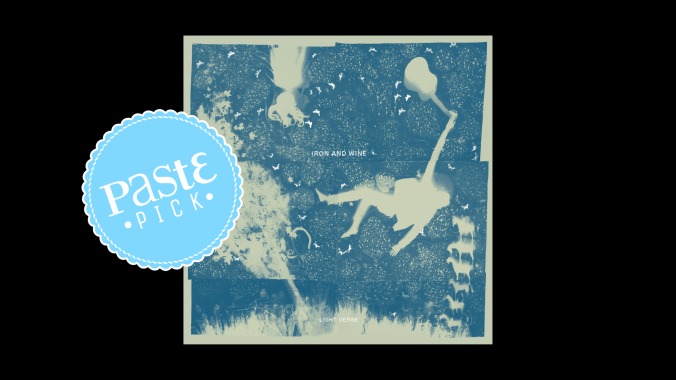On Light Verse, Iron & Wine is Joyfully Nihilist
Samuel Beam returns with an expanded sonic palette while also rekindling the bright spark that made 2007’s The Shepherd’s Dog so magical.
Music Reviews Iron and Wine
Whether you found out about them because the creators of Twilight had remarkably good taste in 2008, or you were already in the know, it’s undeniable that Iron & Wine—the musical project of Samuel Beam—has become an avatar of mid-aughts indie folk. Many have tried to create in the same vein, but none can match the singular magic of Beam’s intimate and startling imagery, or the comforting scratch of his voice, like age-softened bristles.
When the COVID-19 pandemic hit, Beam, unlike many songwriters whose creativity found hidden doors and new roads, felt paralyzed—for over two years, he gave into his anxieties and gave up writing songs. Eventually, a recording project with Finom of Lori McKenna covers brought his creative instincts back to life, after which he embarked on a series of solo tours called Back to Basics. Though this time of paralysis was certainly painful for Beam, it offered both a creative reset and a new perspective.
Light Verse is Sam Beam’s first new solo release since 2017’s Beast Epic and the 2018 follow up EP Weed Garden. Depending on how you define “basics,” the latter two records felt closer to the concept than Light Verse does. Though parts of Light Verse also find Beam returning to the more hushed, acoustic sound of his early few records, there is an incredible vitality present that was lacking from his past few releases. This chapter of Iron & Wine is one of juxtapositions. Throughout the album’s 10 tracks, Beam balances world weariness with self-aware optimism and how to honor your past while welcoming change. But there is also a levity that floats right to the top of the album, skimming over the top of the otherwise weighty themes. Light Verse is, at turns, clever, disarming and quietly funny.
The album’s title refers to the poetic style of light verse, which is often associated with 19th century absurdists like Edward Lear and Lewis Carroll—in other words, not something that anyone who’s cried at every listen of “Resurrection Fern” since 2007 would associate with a musician like Samuel Beam. But the form also includes poets like Dorothy Parker and Dorothea Grossman, both of whom possess a quick-witted humor that was often directly juxtaposed with a starkly beautiful or devastating image. “It’s my first official Iron & Wine comedy album! Just kidding…” Beam has joked. Lyrically, it may very well be his most impressive record. He has always been a master of creating small, bejeweled images, his records like impressionistic collages—and that’s no different on Light Verse, but there is a newly sharpened clarity to his words.
There is something delightfully jarring about hearing Beam, whose entire discography has only three explicitly tagged songs, utter the phrase, “I know we only fucked a couple of times.” But amidst witty lines like, “Nobody’s perfect or as dumb as their luck” and “Miracles never cease / Depending on which ones you believe” on the winkingly upbeat “Cutting It Close,” there are stories of lost love like on the achingly tender “Taken By Surprise” and an earnest acceptance of time and death on “All In Good Time,” the gorgeous duet with Fiona Apple. Like his singer-songwriter heroes Harry Nilsson and John Prine, Beam squeezes both comedy and tragedy out of seemingly mundane moments.
The album’s contradictory moods are reflected in its instrumentation as well. The musical experimentation that garnered such a mixed critical reception for his 2011 and 2013 projects (Kiss Each Other Clean and Ghost on Ghost) feels fully formed here—the product of someone continuing to hone their craft over two decades into their career. Both harmonically and melodically, Light Verse is more expansive, yet its arrangements are tighter. No longer the lone troubadour, Beam is backed by a group of LA musicians whose expert subtlety bolsters Beam’s magnetic quietude—even when Hollywood strings swell or the accompaniment reaches near cacophony.
On Light Verse, every song (and every moment) is met with its equal opposite. Each pair of songs arrive in conversation with each other, communicating joyfulness and heaviness alike. The true crux of the record is found in the space between the Buddy Holly swagger of “Sweet Talk” and the mountainous “Tears That Don’t Matter.” On both, Beam is a nihilist: Nothing matters, so do what you must. But “Sweet Talk” is a jubilant celebration of that fact, a call to throw it all to the wind. “Let’s swing, let’s miss,” Beam sings. Kiss a little harder on the lips / Of a wonderful life.” Through it all, he seems to be looking you straight in the eye, and he wants you to consider the possibility that with enough friction, you might just light a spark.